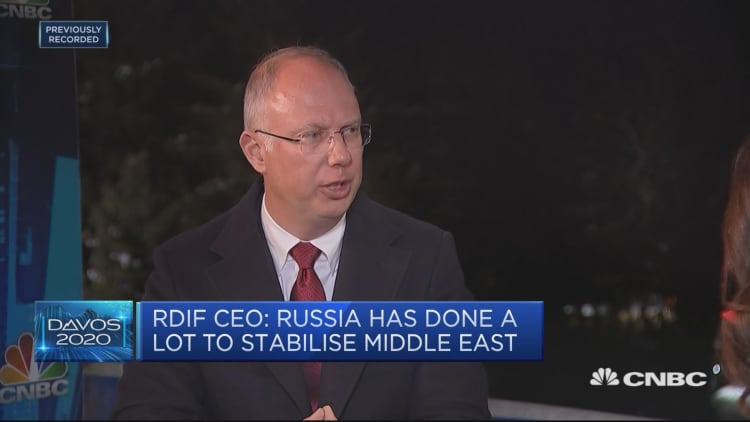Despite the awkwardness of President Donald Trump's impeachment trial and a dispute over Russia's mega gas pipeline to Europe that could shut out U.S. natural gas imports, chief executives in the country are hopeful that Moscow and Washington could reset relations this year.
That hope stems from an apparent rapprochement between Russia and its immediate neighbors in Ukraine and Europe, coupled with an increasing weariness among most western nations regarding the continuation of sanctions on Russia for its 2014 annexation of Crimea from Ukraine.
President Vladimir Putin's announcement of constitutional reforms last week, which many hope will revamp Russia's economy, have also added to optimism regarding political and economic change in the country.
Russian CEOs told CNBC at the World Economic Forum in Davos that they hoped Putin's reforms, that hand more power to Russia's parliament and led to the installation of a new technocrat Prime Minister Mikhail Mishustin, can lead to improvements not only to Russia but to its relations with other global powers, especially the U.S.
"I very much hope that it would also lead to changes in relations (with the U.S.) but the problem is that this is a two-way street," Herman Gref, the chief executive and chairman of Sberbank, told CNBC Tuesday.
"So it is also about trust, a lot would depend on the U.S. elections. So if the relations between the leaders (of our two countries) are based on mutual trust nothing would stand in the way of such a reset. We pin a lot of hopes on such a reset and businesses need it badly," he told CNBC in Davos, Switzerland.

US-Russia relations
U.S.-Russia relations have been scrutinized since Trump's election to the White House in 2016. Russia was accused of meddling in the vote in favor of Trump and to the detriment of Democrat Hillary Clinton although an inquiry led by Special Counsel Robert Mueller did not find sufficient evidence that Trump's team coordinated with Russia to influence the result.
Since then, Trump's relationship with Putin has been in the spotlight and has put the president — who has often shown admiration for his Russian counterpart — in a tricky position. Trump has been pressured by many U.S. lawmakers to maintain and increase sanctions on Russia for meddling, as well as its annexation of Crimea from Ukraine, and the nerve agent poisoning of a former Russian spy in the U.K.
Recently, relations have also been strained over Russia's Nord Stream 2 gas pipeline to Germany. The U.S. sees the pipeline as a way for Russia, already the predominant natural gas supplier to Europe, to cement its control on the region's energy market. Many see the U.S.' objections to the pipeline as coming from the fact that it wants to increase its own liquefied natural gas (LNG) exports to Europe, however. Nonetheless, the U.S. president gave the green light to sanctions on the pipeline in December.
Arguing that those kinds of restrictions were "politically motivated" and unhelpful, Kirill Dmitriev, the chief executive of Russia's $10 billion sovereign wealth fund RDIF, told CNBC that 2020 could still be a good year to reset U.S.-Russia relations.
"We actually believe that this year could be a good year to improve relations with the U.S. Frankly, we can solve lots of anti-terrorism fighting together, we can do lots of things together so, of course, there will be lots of geopolitical and political attacks inside the U.S. but we believe the backdrop is good to improve Russia-U.S. relations this year."
Dmitriev said there were signs of a rapprochement between Russia and its neighbor Ukraine after several years of frosty relations following Moscow's annexation of Crimea and its support for a pro-Russian uprising in the east of the country. That action led to a protracted conflict in the region and thousands of deaths and peace talks have only recently re-started between Russia and Ukraine, brokered by France and Germany.

"Europe already has given lots of signs that it wants to reconcile with Russia and we see lots of progress on Ukraine and Mr Zelensky (Ukraine's president) wants to have some compromises with Russia so we believe that that creates a very positive geopolitical backdrop," Dmitriev noted.
General optimism was tempered by Andrey Kostin, the chairman and president of Russia's second-largest lender VTB Bank.
He told CNBC Tuesday that the 2020 U.S. election — and the thorny issue of Trump's impeachment trial (the president is accused of abuse of power although he denies wrongdoing) — could prevent Putin and the U.S. president from ironing out problems in the relationship.
"I think the big obstacle is the domestic problem in America, because I don't think Mr Trump can hardly talk to Mr Putin while there's impeachment (inquiry) in America," Kostin said. "So we just wait and see."






